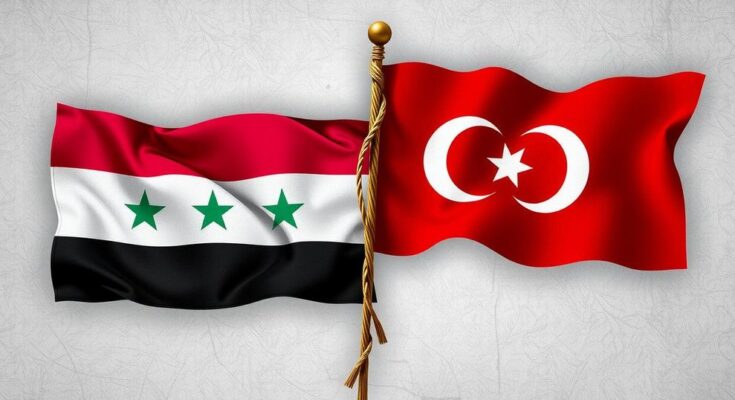In his last days as president, Bashar al-Assad expressed to Iran’s foreign minister that Turkey was supporting rebel forces seeking to overthrow him. Despite Iran’s assurances of support, tensions escalated between Tehran and Ankara, reflecting the ongoing geopolitical complexities in the Syrian civil war and the implications of Assad’s regime change for Iranian influence in the region.
In the waning days of his regime, Syrian President Bashar al-Assad expressed to Iran’s Foreign Minister, Abbas Araghchi, his concerns regarding Turkey’s support for Sunni rebel groups, particularly Hayat Tahrir al-Sham (HTS), which seeks to overthrow his government. During a meeting held on December 2 in Damascus, Assad voiced his discontent over Turkey’s active involvement in the conflict, perceiving it as an earnest effort to destabilize his presidency. In response, Araghchi assured Assad of Tehran’s unwavering support and vowed to address these concerns with Turkish officials.
The following day, Araghchi met with Turkish Foreign Minister Hakan Fidan, where he articulated Iran’s dissatisfaction with Turkey’s alignment with Western interests that undermine Iranian allies in the region. Fidan attributed the ongoing crisis to Assad’s oppressive governance and neglect of genuine peace negotiations, which he claimed had exacerbated the conflict. This exchange underscored the increasing tensions between Iran and Turkey regarding their conflicting roles in the Syrian civil war.
Iranian Supreme Leader Ayatollah Ali Khamenei further deemed Assad’s expulsion as the fruition of a conspiracy orchestrated by the United States and Israel, hinting at Turkey’s involvement. As a NATO member, Turkey has significantly influenced the civil war dynamics, controlling territory in northern Syria while supporting opposition factions aimed at ousting Assad since the conflict’s inception in 2011. Assad’s departure represents a critical setback for Iranian and Hezbollah influence in the region, disrupting their logistical corridor extending from Iraq to Lebanon and undermining their military aid pipeline to Hezbollah.
Following the war, Tehran invested heavily in supporting Assad, dispatching Revolutionary Guards to fortify his regime, while Hezbollah also played a crucial role in the conflict. However, in the past year, Hezbollah was compelled to withdraw some of its combatants to confront threats from Israel, thereby weakening the Syrian government’s defenses.
The ongoing Syrian civil war, which began in 2011, has involved various regional powers and numerous factions vying for influence. The conflict has seen Syria divided, with Assad’s government backed by Iran and its allies, while other factions, including Kurdish groups and Sunni rebels, receive varying degrees of support from Turkey and Western nations. The geopolitical stakes in Syria highlight the intersecting interests of these nations, with Turkey’s role particularly pertinent due to its opposition to Assad’s regime and its NATO affiliation.
The final days before Bashar al-Assad’s ouster were marked by escalating tensions between Iran and Turkey regarding the latter’s support for opposition forces. This friction reflects broader geopolitical struggles in the region, as Iran loses a crucial ally in Assad amidst its quest to counterbalance U.S. and Israeli influences. The unfolding situation underscores the complexities of the Syrian conflict, where regional ambitions continue to conflict, further complicating any potential resolution.
Original Source: www.voanews.com




